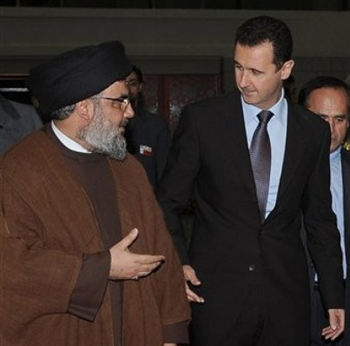Between Donald Trump and Hassan Nasrallah
Diana Moukalled/Al Arabiya/March 08/16
Last week, an MBC program that aired a comedy sketch impersonating Hezbollah leader Hassan Nasrallah outraged his supporters in Lebanon, who expressed their anger on social media and on the streets. Meanwhile, comedian John Oliver – who hosts the HBO program Last Week Tonight – mocked U.S. Republican presidential candidate Donald Trump and created a Twitter hashtag against him. Prominent commentators considered the Last Week Tonight episode as one of the most significant political responses against Trump. Most of the points that Oliver raised have been separately mentioned in the past on other satirical programs, but he managed to include all of Trump’s contradictions and follies in one coherent segment that was creatively and successfully put together.
Journalism and satire
This style of mixing journalism with satire has become hugely popular, as was Oliver’s segment on Trump. Of course no one protested on the streets, like what happened in Lebanon, where we are still discussing the concept of satire before even getting to content. The protesters see this as a huge threat to people whose fates and minds are under Hezbollah’s control. Satire seems more dangerous to the party’s image than death. The professionalism of the episode that mocked Nasrallah cannot be compared with that of Oliver’s, but we are trying to laugh despite all attempts by Hezbollah officials and supporters to shut us up. It is easy to gather Nasrallah’s contradictory statements, and perhaps this is what worries Hezbollah. Fear of satire is widespread in Arab societies, and has increased following the Arab Spring. Regarding the sketch about Nasrallah, protests did not erupt because the content was weak, but because of laughter at clear flaws. The protesters see this as a huge threat to people whose fates and minds are under Hezbollah’s control. Satire seems more dangerous to the party’s image than death.
Lebanon’s PM urges Hezbollah not to attack Saudi
Al Arabiya News Channel Tuesday, 8 March 2016/
Lebanon’s Prime Minister Tammam Salam has urged the head of Shiite movement Hezbollah Hassan Nasrallah to not attack Saudi and Gulf countries, in an exclusive interview with Al Arabiya News Channel late Monday. Salam stressed the importance of strengthening Lebanon as a nation during an interview with Al Arabiya News Channel’s Panorama program which discussed whether it is “Lebanon’s job to control Hezbollah’s behavior?” Last week, Gulf states declared Hezbollah a “terrorist” group, in the latest regional move against the organization fighting in support of Syria’s regime. Gulf nations have taken a series of measures against Hezbollah since Saudi Arabia last month halted a $3 billion program funding French military supplies to Beirut. Hezbollah is backed by Iran, with whom Saudi Arabia’s relations have worsened this year. The two are on opposing sides in conflicts in Syria and Yemen. Salam decried Hezbollah’s intervention in the region and said it has reflected negatively on Lebanon. He hailed historic ties between Gulf states and Lebanon, and said relations are continuing. The premier hailed Saudi Arabia for hosting and backing the Taif agreement in 1989, which provided “the basis for the ending of the civil war and the return to political normalcy in Lebanon.”


















